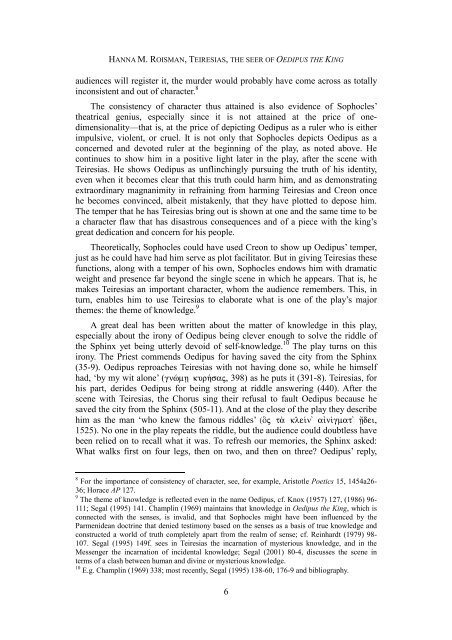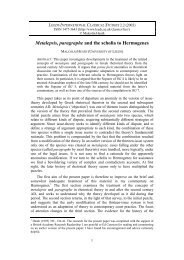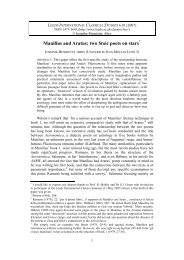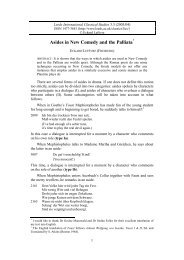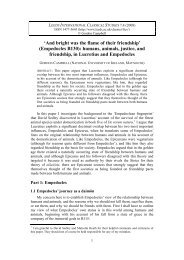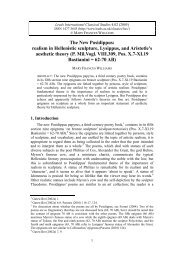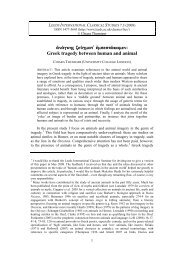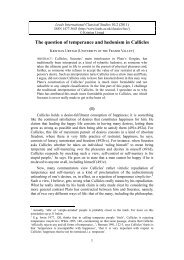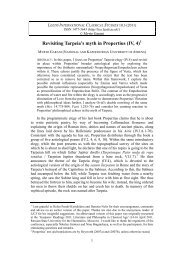Teiresias, the seer of Oedipus the King - Leeds International ...
Teiresias, the seer of Oedipus the King - Leeds International ...
Teiresias, the seer of Oedipus the King - Leeds International ...
Create successful ePaper yourself
Turn your PDF publications into a flip-book with our unique Google optimized e-Paper software.
HANNA M. ROISMAN, TEIRESIAS, THE SEER OF OEDIPUS THE KING<br />
audiences will register it, <strong>the</strong> murder would probably have come across as totally<br />
inconsistent and out <strong>of</strong> character. 8<br />
The consistency <strong>of</strong> character thus attained is also evidence <strong>of</strong> Sophocles’<br />
<strong>the</strong>atrical genius, especially since it is not attained at <strong>the</strong> price <strong>of</strong> onedimensionality—that<br />
is, at <strong>the</strong> price <strong>of</strong> depicting <strong>Oedipus</strong> as a ruler who is ei<strong>the</strong>r<br />
impulsive, violent, or cruel. It is not only that Sophocles depicts <strong>Oedipus</strong> as a<br />
concerned and devoted ruler at <strong>the</strong> beginning <strong>of</strong> <strong>the</strong> play, as noted above. He<br />
continues to show him in a positive light later in <strong>the</strong> play, after <strong>the</strong> scene with<br />
<strong>Teiresias</strong>. He shows <strong>Oedipus</strong> as unflinchingly pursuing <strong>the</strong> truth <strong>of</strong> his identity,<br />
even when it becomes clear that this truth could harm him, and as demonstrating<br />
extraordinary magnanimity in refraining from harming <strong>Teiresias</strong> and Creon once<br />
he becomes convinced, albeit mistakenly, that <strong>the</strong>y have plotted to depose him.<br />
The temper that he has <strong>Teiresias</strong> bring out is shown at one and <strong>the</strong> same time to be<br />
a character flaw that has disastrous consequences and <strong>of</strong> a piece with <strong>the</strong> king’s<br />
great dedication and concern for his people.<br />
Theoretically, Sophocles could have used Creon to show up <strong>Oedipus</strong>’ temper,<br />
just as he could have had him serve as plot facilitator. But in giving <strong>Teiresias</strong> <strong>the</strong>se<br />
functions, along with a temper <strong>of</strong> his own, Sophocles endows him with dramatic<br />
weight and presence far beyond <strong>the</strong> single scene in which he appears. That is, he<br />
makes <strong>Teiresias</strong> an important character, whom <strong>the</strong> audience remembers. This, in<br />
turn, enables him to use <strong>Teiresias</strong> to elaborate what is one <strong>of</strong> <strong>the</strong> play’s major<br />
<strong>the</strong>mes: <strong>the</strong> <strong>the</strong>me <strong>of</strong> knowledge. 9<br />
A great deal has been written about <strong>the</strong> matter <strong>of</strong> knowledge in this play,<br />
especially about <strong>the</strong> irony <strong>of</strong> <strong>Oedipus</strong> being clever enough to solve <strong>the</strong> riddle <strong>of</strong><br />
<strong>the</strong> Sphinx yet being utterly devoid <strong>of</strong> self-knowledge. 10 The play turns on this<br />
irony. The Priest commends <strong>Oedipus</strong> for having saved <strong>the</strong> city from <strong>the</strong> Sphinx<br />
(35-9). <strong>Oedipus</strong> reproaches <strong>Teiresias</strong> with not having done so, while he himself<br />
had, ‘by my wit alone’ (gnèmV kur»saj, 398) as he puts it (391-8). <strong>Teiresias</strong>, for<br />
his part, derides <strong>Oedipus</strong> for being strong at riddle answering (440). After <strong>the</strong><br />
scene with <strong>Teiresias</strong>, <strong>the</strong> Chorus sing <strong>the</strong>ir refusal to fault <strong>Oedipus</strong> because he<br />
saved <strong>the</strong> city from <strong>the</strong> Sphinx (505-11). And at <strong>the</strong> close <strong>of</strong> <strong>the</strong> play <strong>the</strong>y describe<br />
him as <strong>the</strong> man ‘who knew <strong>the</strong> famous riddles’ (Öj t¦ kle…n' a„n…gmat' Édei,<br />
1525). No one in <strong>the</strong> play repeats <strong>the</strong> riddle, but <strong>the</strong> audience could doubtless have<br />
been relied on to recall what it was. To refresh our memories, <strong>the</strong> Sphinx asked:<br />
What walks first on four legs, <strong>the</strong>n on two, and <strong>the</strong>n on three? <strong>Oedipus</strong>’ reply,<br />
8<br />
For <strong>the</strong> importance <strong>of</strong> consistency <strong>of</strong> character, see, for example, Aristotle Poetics 15, 1454a26-<br />
36; Horace AP 127.<br />
9<br />
The <strong>the</strong>me <strong>of</strong> knowledge is reflected even in <strong>the</strong> name <strong>Oedipus</strong>, cf. Knox (1957) 127, (1986) 96-<br />
111; Segal (1995) 141. Champlin (1969) maintains that knowledge in <strong>Oedipus</strong> <strong>the</strong> <strong>King</strong>, which is<br />
connected with <strong>the</strong> senses, is invalid, and that Sophocles might have been influenced by <strong>the</strong><br />
Parmenidean doctrine that denied testimony based on <strong>the</strong> senses as a basis <strong>of</strong> true knowledge and<br />
constructed a world <strong>of</strong> truth completely apart from <strong>the</strong> realm <strong>of</strong> sense; cf. Reinhardt (1979) 98-<br />
107. Segal (1995) 149f. sees in <strong>Teiresias</strong> <strong>the</strong> incarnation <strong>of</strong> mysterious knowledge, and in <strong>the</strong><br />
Messenger <strong>the</strong> incarnation <strong>of</strong> incidental knowledge; Segal (2001) 80-4, discusses <strong>the</strong> scene in<br />
terms <strong>of</strong> a clash between human and divine or mysterious knowledge.<br />
10<br />
E.g. Champlin (1969) 338; most recently, Segal (1995) 138-60, 176-9 and bibliography.<br />
6


